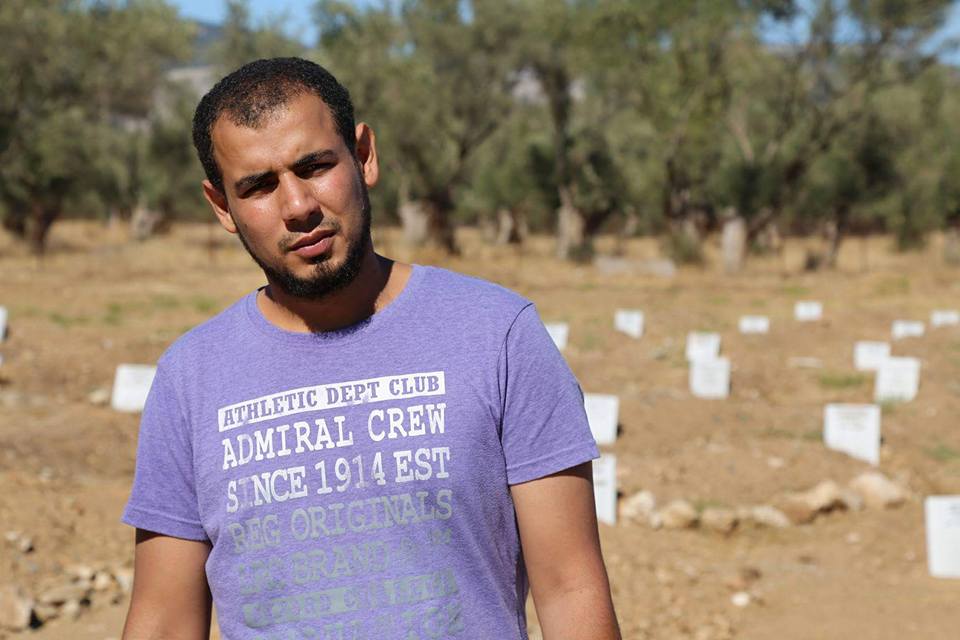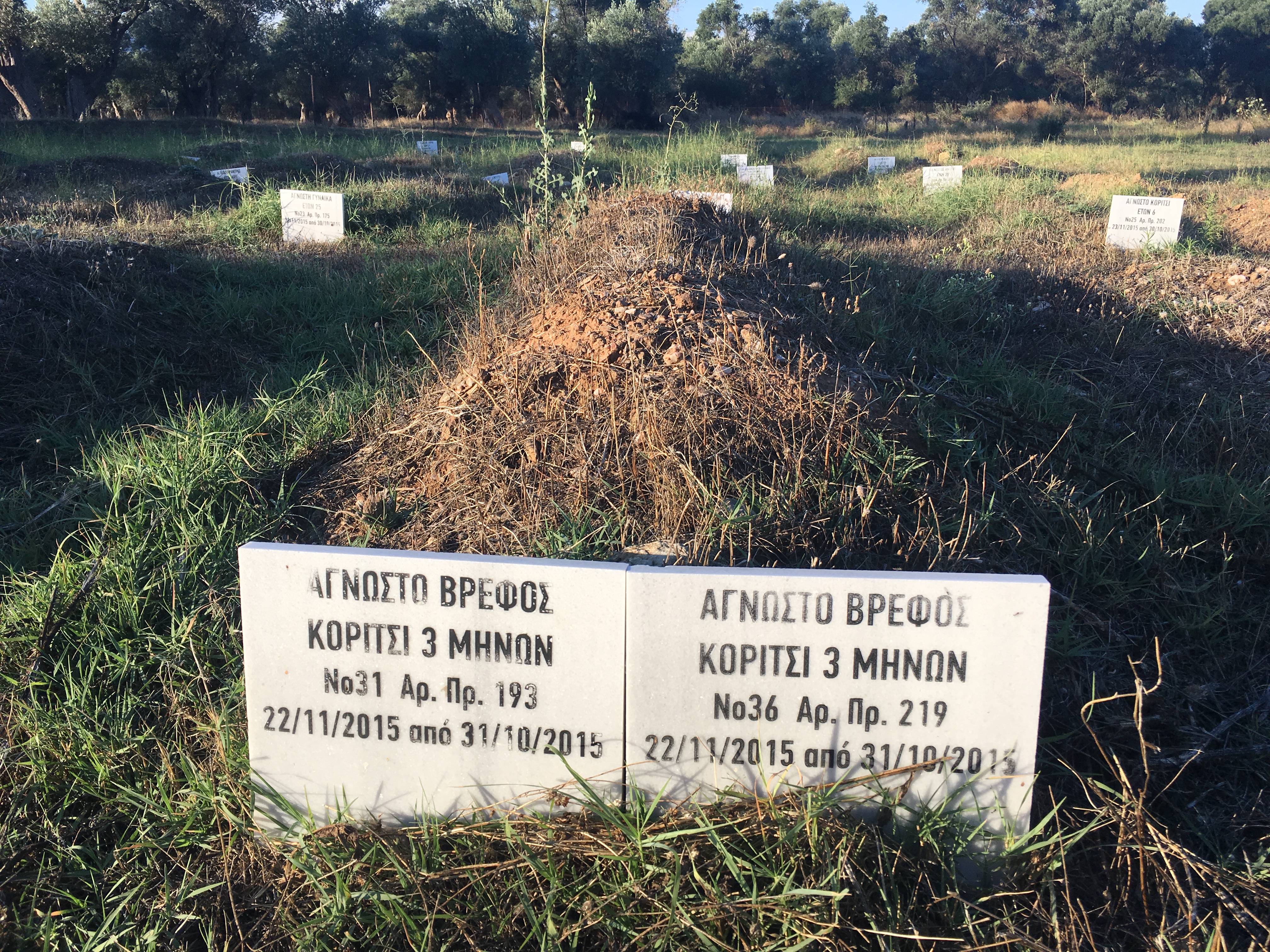By Karolen Eid
KATO TRITOS, Greece — Moustafa Dawa never planned on becoming an undertaker. The 32-year-old Egyptian translator came to Greece to study Greek literature. He now buries bodies in an unofficial cemetery in a remote olive grove on the island of Lesbos.
He works in a small shed, washing and wrapping the bodies. Three pieces of cloth for the men. Five for the women. He prays for them and positions them in the ground with their heads facing Mecca. He hopes that they will be found by their loved ones.
For three years, Dawa has been managing the only Muslim cemetery for refugees on the island. He is just one figure in a fight against the obstacles facing Muslim migrant burial in Lesbos, which include the lack of an official cemetery, lack of support for families in the identification process, and possible corruption by NGOs claiming that they are collecting donations for this cause. Dawa’s experience provides a rare glimpse into the hidden tensions of an often overlooked aspect of the refugee crisis. Not only life and death, but what comes after.

Moustafa Dawa, the unofficial undertaker of the Muslim cemetery of Lesbos
In October of 2015, Dawa was working as a translator for migrants in the camps of Lesbos when the sinking of three migrant boats sent dozens of bodies to the morgue in the hospital of Mytilene. Until then, the bodies of Muslim migrants had been buried in a small section of the cemetery at St. Panteleimon’s church. With the overwhelming increase in the death toll during the perilous journey between Turkey and Greece, the cemetery was full.
A Syrian man looking for his sister’s body asked Dawa to translate for him at the hospital, he said. Dawa was shocked to see the condition in which the bodies were kept.
“In that moment, I died inside,” he said. “I felt like I wasn’t human, and I couldn’t live with this situation.” Dawa remembers seeing bodies stacked on top of each other in the container.
The hospital was not prepared for the tragedies and its last resort was to use a standard refrigerated shipping container donated by the International Red Cross.
The Red Cross’ Field Manual for the Management of Dead Bodies after Disasters says that a container should hold a maximum of 50 bodies. Theodoros Nousias, the coroner who took DNA samples and performed autopsies on the bodies, said that there were 85 bodies in this container at one point.
Although international regulations allow for bodies to be kept in a morgue for 40 days throughout the identification process, Islamic law holds that bodies should be buried within 24 hours of death. But even after 40 days, there was no more space in the cemetery.
Dawa said that he decided to push the municipality to provide land for a proper Muslim burial for the migrants. He joined with some volunteers, friends, and families of migrants to storm into town hall and demand this land, he said. They got the attention of deputy mayor George Katzanos, who Dawa describes as “the only real human I met in Lesbos.”
Katzanos managed to convince the municipality to provide some land for the cemetery near the tiny village of Kato Tritos. In the first eight days, Dawa buried 57 bodies. He relied on his educational background in following Islamic tradition as he had received his bachelor’s degree from Al-Azhar University, widely known as “Sunni Islam’s most prestigious university.”
Despite his efforts, the cemetery still has no official designation. It is still an olive grove to the government.
According to Marios Andriotis-Konstantios, the international relations senior advisor of the Lesbos Municipality, the designation for the cemetery is delayed by a law stating that no cemeteries should be established within 200 meters of a water supply.
The Kato Tritos cemetery happens to be 193 meters away from the nearest water supply.
Dawa said that the legality of the makeshift cemetery is only one of the problems facing the process of burial for the migrants. Another is identification.
Searching for a daughter
Dawa makes tombstones for the unidentified bodies. “Unknown woman Age 30 No. 134,” one reads. “Unknown female infant 3 months old No. 31,” another says. Most of the bodies in Dawa’s cemetery are unidentified. Some arrive headless or missing limbs, detached after weeks or months in the water. He makes sure to include on the tombstone the number assigned to their DNA samples so one day they might be identified by their family members. But some families are not aided by the DNA identification process.
Doha Al-Amir has been trying to identify her lost 12-year-old daughter’s body for three years. When she reached out to Dawa with a picture of her daughter, he recognized her clothes and a scar on her arm. He knew he had buried young Mina himself. Yet her mother still wants to confirm this through DNA.
When Al-Amir reached out to multiple organizations, including the Iraqi Red Cross and the International Red Cross, they told her they did not have the ability to help her take the DNA sample which could potentially reconnect her with her daughter. She has been sent from organization to organization with no result.
“What’s the role of the Red Cross if they wouldn’t solve a problem like this?” Dawa asked. “What’s their role when they take billions of dollars?”
The Last Rights Project, which seeks to create a new framework for the rights of missing and dead migrants, invited Dawa to a two-day conference on the issue that drew representatives from the United Nations, the International Red Cross, the Greek Refugee Council and other organizations. Dawa presented a video of the mother pleading with the international organizations for help with the identification. No aid was forthcoming.
“Nobody cared about her,” Dawa said. “We spoke with the Red Cross. We spoke with the UN. We spoke with journalists.”
The mother remains in war-torn Iraq, waiting for closure. She finds solace that the body of her older daughter, 14-year-old Tabarak, was found — and identified — on the shore of Turkey.

The grave of two unidentified infants, each three months old.
(Isaac Wolfe)
“I’m tired of the organizations.”
Dawa said he has developed a distrust of NGOs and human rights organizations while working on Lesbos. Several small organizations have been collecting donations for the burial of refugees on the island. He claims he has never received those donations and that the organizations broke into the cemetery, took pictures and posted them online to take credit. Dawa showed a reporter the broken locks on the gate and the door of his shed.
Khazer Hussein, international program manager for All 4 Humanity, said that his organization is collecting donations for the burial process. The bodies are buried in Lesbos’ Muslim cemetery, he said. Several other organizations including Team Humanity and Humans 4 Humanity claim to be collecting donations for this purpose as well.
There is no need for these organizations to be collecting donations, said Andriotis-Konstantios, the senior advisor to the mayor of Mytilene. He explained that the municipality covers the expenses of burial.
Dawa’s cemetery is the only one for Muslims in Lesbos, and he says that it receives no money from the organizations. He believes that his clashes with the organizations almost got him killed.
On August 1, 2016, he said, he received a phone call from a volunteer asking him to see her and claiming that she needed his help. When Dawa went outside, four masked men armed with knives attacked him. As evidence, he shows scars on his forearms and head.
Dawa says he knows which human rights organization they were from and believes that they were trying to get rid of him to take credit, and collect donations, for the cemetery. Fearing further conflict, he refused to name the organization.
“I’m the number one enemy of the organizations,” he said.
Like the refugees he helps, Dawa feels stuck on the island. He said he wants to leave to continue his studies, to return to his life. He is sick of the atmosphere on Lesbos. “I feel like I put too much pressure on myself,” he said. “I feel like I can’t go on.”
Still Dawa fears that the cemetery will be disrespected or misused if he leaves. He plans to stay until the cemetery has an official designation and caretaker. Until then, he has been keeping detailed records of each burial. He knows the inhabitant of each grave, identified and unidentified.
“The truth is that even the municipality here and the Greek state doesn’t know who is buried in the cemetery. Nobody knows except for me,” he said. “So if I die right now, the secret of the cemetery will die with me.”
